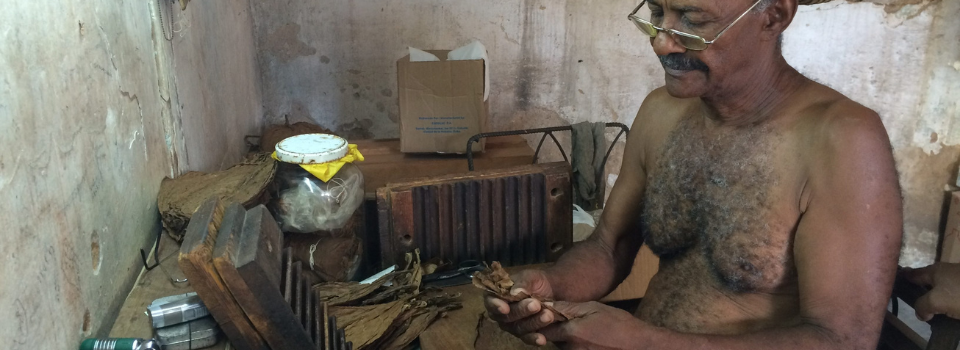Experiencing Cuba’s Local Culture
Americans are now welcome to travel to Cuba as long as their visit meets 1 of 12 approved ‘purpose of travel’ categories. Should you be joining us on one of our bicycle tours in Cuba your trip will qualify for the Support for the Cuban People travel category. Our local partner is is licensed by the Office of Foreign Assets Control (OFAC), which is part of the United States Treasury Department, to provide travel services to Cuba under the category of Support for the Cuban People. This category is intended to direct the economic activities of U.S. travelers to primarily benefit the private sector in Cuba as well as engaging our travelers in meaningful interactions with individuals in Cuba. This requires a full-time agenda of such activities and thus tours in Cuba have somewhat less flexibility than our tours in other countries. Exploring the local culture of a country is an integral piece of all of our tours, so while friendly exchanges with locals is not a new concept for us, you can rest assured you’ll get a feel for local life in Cuba as well as meet the required requirements during your visit. Here are some examples of the encounters and exchanges you can expect to have on our tours through Cuba.
(Please be aware that though we do our best to include all of the exchanges described below there may be instances where it just isn’t possible.)
Cultural exchanges at a glance:
Bicycling Central Cuba
Bicycle Taxi (bicitaxi) Business. Take a spin with local bicycle taxi (bicitaxi) owners followed by coffee and conversation about owning a bicitaxi businesses and the challenges in maintaining their bikes.
Performance by the Choir of Cienfuegos. Visit this internationally-acclaimed music group’s practice center in one of the many historic buildings of Cienfuegos for a private concert. Following the performance some of the chorus members will join the our travelers to talk about Cuba’s emphasis on music education, the place of music in Cuban culture and how they personally got involved in music.
Korimacao Art School Visit. For a country with few resources, Cuba commits a fair amount to the arts. Throughout the country there are publicly-funded music conservatories and special arts and music schools. Students come from all over Cuba to attend Korimacao boarding school where they are immersed in a variety of art forms, including music, theater, plastic arts, painting and more. The school’s director will provide a tour of the facilities and share some insights about the school’s goals and mission; ending with a special performance.
Walking tour of Old Havana with a local Cuban guide. See the streets of Havana and visit four major plazas to gain a better understanding of Spanish Colonial history as well as current building and architectural preservation projects taking place today.
Evening visit with entrepreneur Julio Muñoz. Spend an evening in Muñoz’s home to learn about this famed photographer, casa owner, and electrical engineer’s perspectives on life in Cuba. Julio has traveled to the U.S. many times but chosen to remain in his home town where he has had to be creative to run his various businesses. This renaissance man also channeled his passion for animals to start a foundation that teaches locals how to better care for their animals.
Bicycling Western Cuba
Visit Las Terrazas: A UNESCO protected biosphere originally created as part of Castro’s 1968 reforestation proposal. The region, which had been over-logged since the enterprising days of Spanish conquistadors and coffee plantations, is now a verdant haven for over 117 different bird species including the endemic tocororo and zorzal.
Walking tour of Old Havana with a local Cuban guide. See the streets of Havana and visit four major plazas to gain a better understanding of Spanish Colonial history as well as current building and architectural preservation projects taking place today.
Visit workers at a tobacco-drying barn. Some rides will take cyclists past fields of tobacco and handsome tobacco-drying barns made of wood and palm thatch. The contrast between the rich green of the fields and weathered gray of the barns is stunning. Our tour visits one of these plantations as we learn how the crop gets to market, learn about the economic system that supports the plantations, and the two to three year process from harvest and the finished cigar.
Guided tour of Soroa’s famous Orchid gardens. Learn about the specific role these plants fulfill in their ecosystem, and the beauty of their adaptations.
Walk through the Viñales Valley. Let a local guide share some farming practices used throughout the Valley. Cuba is poor and can’t afford chemical pesticides or fertilizers, farm products are considered organic. Travelers will learn how farmers control pests and help their crops thrive through natural methods. In addition to field crops, visitors will learn about various fruit trees and how locals use local plants for homeopathic remedies.
The Grand Cycling Tour of Cuba: Central and Western
Includes all of the activities listed above.


